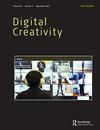基于文化意识的非物质文化遗产数字化教育接受模式
IF 2.7
4区 艺术学
0 ART
引用次数: 0
摘要
摘要尽管数字教育在非物质文化遗产(ICH)中的应用越来越多,但用户对数字技术的接受程度还有待进一步调查。在这项研究中,我们开发了一个移动AR系统,用于非物质文化教育,以了解用户对数字技术的接受程度。本研究建立了基于文化意识、通用学习成果(GLOs)和技术接受模型的概念模型和假设,旨在构建适合非物质文化遗产的数字化学习模型。研究结果表明,该测量模型具有良好的信度和效度。此外,外部变量的重要性得到了确认。文化意识和GLOs影响用户感知有用性和感知易用性。此外,感知有用性和易用性对使用态度有积极影响,而态度又对行为使用意图有积极影响。关键词:移动设备学习;增强现实;非物质文化遗产;技术验收模型;披露声明作者未报告潜在的利益冲突。本研究由中华民国教育部资助[批准号:PHA1101038];台北市政府[批准号]。本文章由计算机程序翻译,如有差异,请以英文原文为准。
An acceptance model of digital education in intangible cultural heritage based on cultural awareness
ABSTRACTDespite the increasing application of digital education in intangible cultural heritage (ICH), user acceptance of digital technology needs further investigation. In this study, a mobile AR system for ICH education was developed to understand user acceptance of digital technology. This study developed a conceptual model and hypotheses based on cultural awareness, generic learning outcomes (GLOs), and the technology acceptance model, aiming to construct an appropriate digital learning model for ICH. The results of the study indicated that the reliability and validity of the measurement model were satisfactory. In addition, the importance of external variables was confirmed. Cultural awareness and GLOs affected users’ perceived usefulness and perceived ease of use. In addition, perceived usefulness and ease of use had a positive effect on attitudes toward the use, which in turn had a positive effect on behavioural intention to use.KEYWORDS: Learning on mobile device; augmented reality; intangible cultural heritage; technology acceptance model; cultural awareness Disclosure statementNo potential conflict of interest was reported by the author(s).Additional informationFundingThis work was supported by Ministry of Education of the Republic of China [grant number: PHA1101038]; Taipei City Government [grant number: ].
求助全文
通过发布文献求助,成功后即可免费获取论文全文。
去求助
来源期刊

DIGITAL CREATIVITY
ART-
CiteScore
3.10
自引率
9.10%
发文量
19
期刊介绍:
Digital Creativity is a major peer-reviewed journal at the intersection of the creative arts, design and digital technologies. It publishes articles of interest to those involved in the practical task and theoretical aspects of making or using digital media in creative disciplines. These include but are not limited to visual arts, interaction design, physical computing and making, computational materials, textile and fashion design, filmmaking and animation, game design, music, dance, drama, architecture and urban design. The following list, while not exhaustive, indicates a range of topics that fall within the scope of the journal: * New insights through the use of digital media in the creative process * The relationships between practice, research and technology * The design and making of digital artefacts and environments * Interaction relationships between digital media and audience / public * Everyday experience with digital design and artwork * Aspects of digital media and storytelling * Theoretical concepts
 求助内容:
求助内容: 应助结果提醒方式:
应助结果提醒方式:


